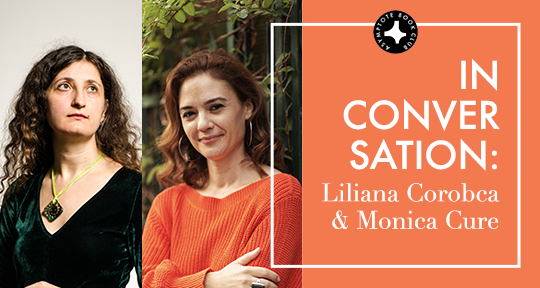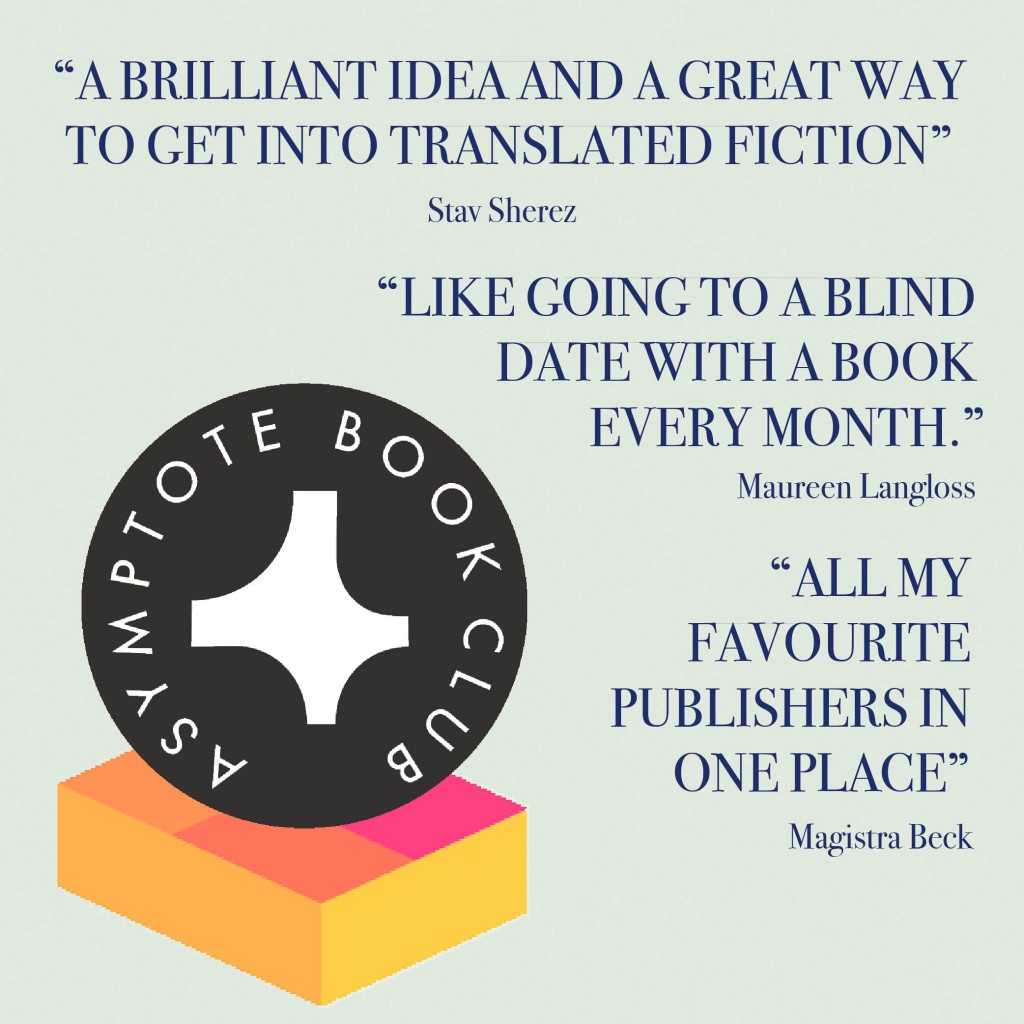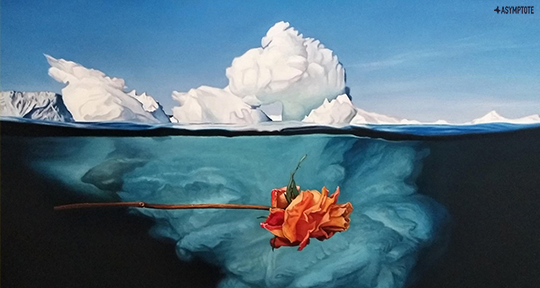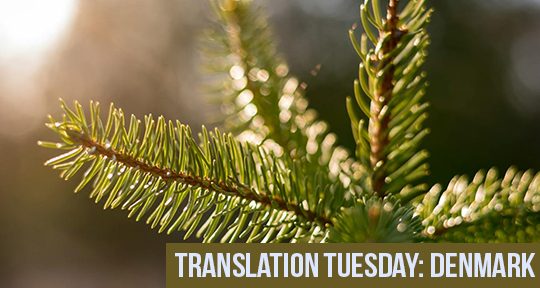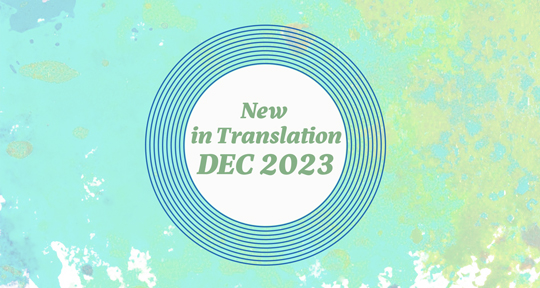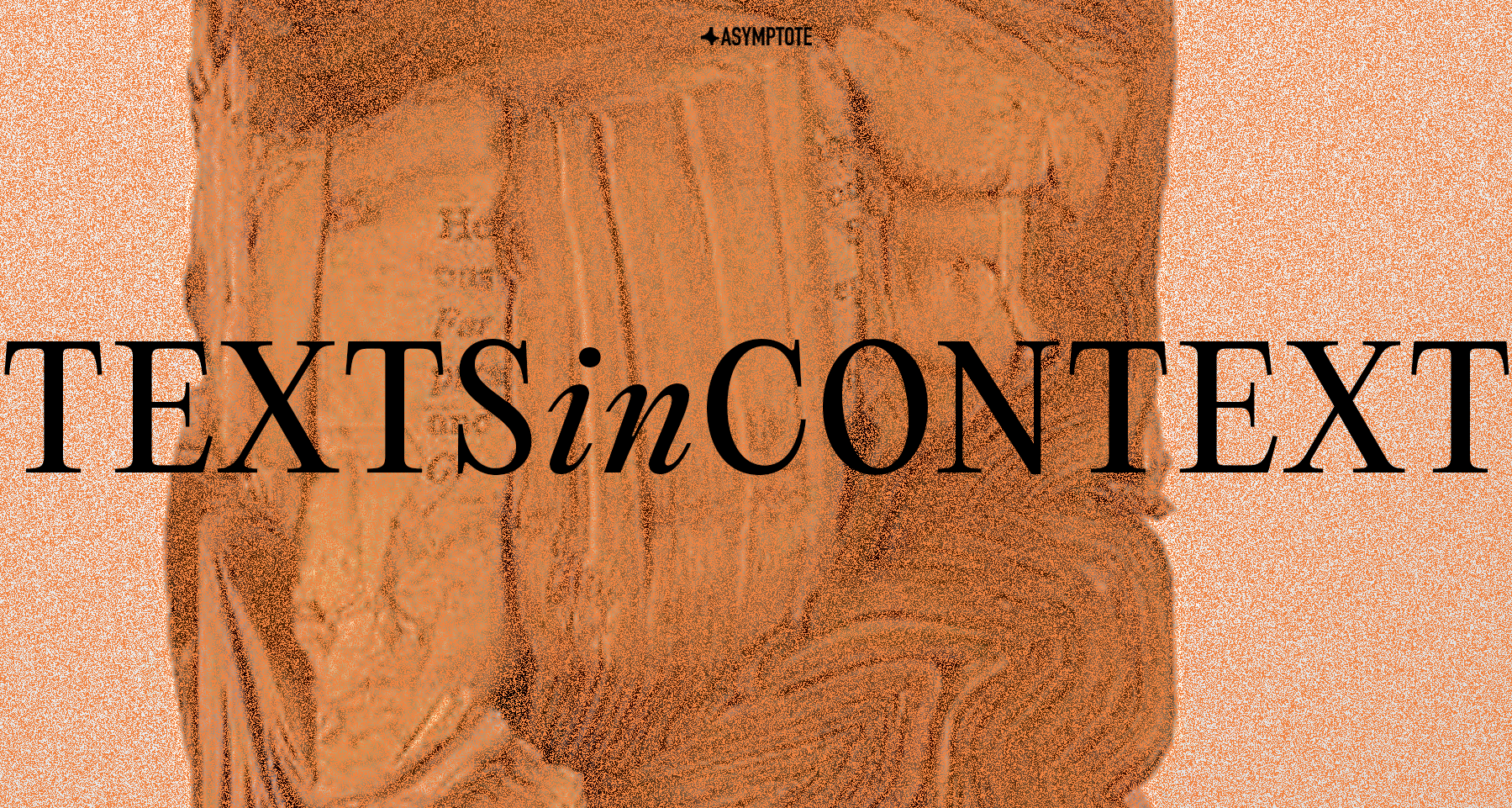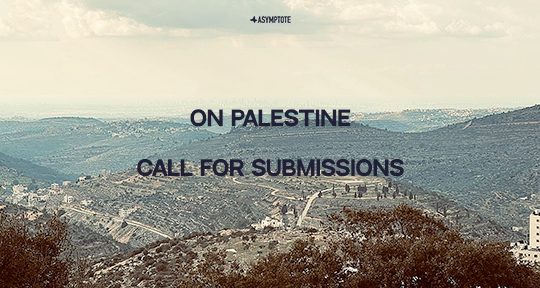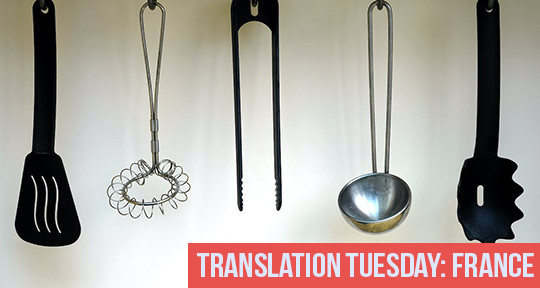
You’re Invited: Join our 2024 Reading Challenge!

Is reading adventurously one of your New Year’s resolutions? We can help with that!
Announcing our December Book Club Selection: On the Isle of Antioch by Amin Maalouf
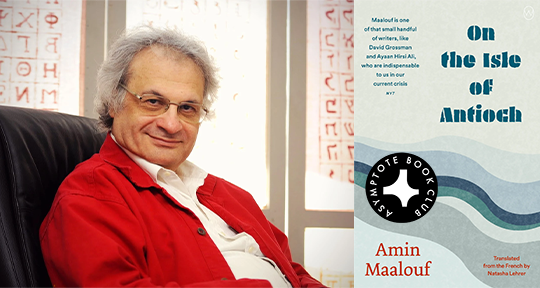
[Maalouf] offers us a human way to experience cataclysm without masking the confusion and desperation that takes hold. . .
For our final title of 2023, we are proud to present the latest novel by acclaimed French-Lebanese writer Amin Maalouf, whose extraordinary work weaves fantasy and history with a powerful reckoning of contemporary issues. In On the Isle of Antioch, Maalouf turns to dystopian narrative to explore the frailties and failures of human empires, drawing a surreal evolution of events that escalate from the very real threat of total global destruction. With a philosophical richness that finds footholds in Maalouf’s elegant, nebulous depictions of desire and connection, the novel is a beautiful, necessary rumination on what survival means on the precipices of so much devastation.
The Asymptote Book Club aspires to bring the best in translated fiction every month to readers around the world. You can sign up to receive next month’s selection on our website for as little as USD20 per book; once you’re a member, join our Facebook group for exclusive book club discussions and receive invitations to our members-only Zoom interviews with the author or the translator of each title.
On the Isle of Antioch by Amin Maalouf, translated from the French by Natasha Lehrer, World Editions, 2023
There is something eerie about reading Amin Maalouf’s On The Isle of Antioch during the same days described by its narrator’s journal entries. In four sections, or “notebooks”, that date from November 9 to December 9, Maalouf’s surreal, thrilling novel is told through the experiences of Alexander, an artist and one of two inhabitants on the titular island of Antioch, as he travels in this brief window of time through isolation, doom, communion, and the unexpected orders and disorders of a dying world.
Having inherited the land from his father, who had refused to sell the deed despite financial difficulties, Alexander decides, in the wake of his parents’ death, to change his life. He begins drawing, releasing work under the pseudonym Alec Zander, and moves to Antioch in a reprieve of his childhood fantasies, calling it his “ancestral island.” Believing himself to be the only inhabitant and sole owner, he’s surprised to find, while waiting for his house to be built, that a woman and writer by the name of Ève had long ago purchased the remaining portion of the island that he did not own, and, being “eager for solitude”, she too has made it her home. Ève’s been in a rut, having published one masterpiece—a novel titled The Future Doesn’t Live Here Anymore—before losing her job and retiring to Antioch, where she sleeps all day and is awake all night, trying to work.
What drives these two loners together, after months of avoiding each other’s company, is a sudden blackout. When all the lights and appliances in Alexander’s house turn off, and even the radio plays only an ominous whistling on every station, he goes to see Ève, suddenly overwhelmed by a solitude that now weighs more heavily on him than ever, and feeling “for the first time in twelve years, [that he] slightly regret[s] not living in a town or a village like an ordinary mortal.” Having previously thought of Ève only as a “silent, ghostly, almost nonexistent” presence, it is only after this incident—which turns out to be a full blackout of all communication systems—that Alexander and Ève are able to find themselves in one another’s company. READ MORE…
Upcoming Opportunities in Translation

For our final post of the year, we decided to compile a list of opportunities for all you translators out there to apply to. Onward and upward!
Opportunities abound for the emerging translator! Just in time for the year-end break—this will be our final post of the year—we sifted through the latest ones and compiled the best and timeliest for our new one-stop hub, “Upcoming Opportunities in Translation.” See you on the other side of the New Year!
AWARDS
SARAH MAGUIRE PRIZE
The 2024 Sarah Maguire Prize for Poetry in Translation is now open for submissions. This international prize is awarded every two years to a translated book of poetry by a “poet living beyond Europe”. The winners will receive £3000, to be divided between the poet and their translator, and will be included in a Poetry Book Society promotion alongside up to seven other shortlisted titles. Past winners include Palestinian poet Najwan Darwish and Chinese poet Yang Lian.
Founded in 2020, the Prize commemorates the Poetry Translation Center’s founder, renowned poet Sarah Maguire, and seeks to celebrate the art of poetry in translation, which the PTC calls “the lifeblood of poetry”. Applications close on Monday, January 1st, 2024.
WORLD LITERATURE TODAY – STUDENT TRANSLATION PRIZE
World Literature Today offers an annual competition for students enrolled in translation studies programs worldwide, and applications are open! Consistent with WLT’s commitment to serving international and university communities alike, the Student Translation Prize seeks to recognize the work of emerging translators from anywhere in the world.
Entries should include a piece of translated prose (up to 1,000 words) or three pieces of poetry, along with a cover letter. $200 will be awarded to one prose translation and one poetry translation. Both will also be published online in the summer.
Applications are due January 11th, 2024.
MO HABIB TRANSLATION PRIZE IN PERSIAN LITERATURE
The Department of Middle Eastern Languages and Cultures at UW is thrilled to announce that the Mo Habib Translation Prize in Persian Literature is open for submissions for its second cycle. In partnership with the Mo Habib Memorial Foundation and Deep Vellum Publishing, this prize aims to commemorate the life of Mohammed Habib through the celebration of Persian literary works.
This cycle will focus on Persian poetry from the 10th century CE to the present day. Bi- or multilingual projects are more than welcome, as are collections of poems from more than one author. Applicants should submit a cover letter, a CV, and a sample of the proposed translation by March 1st, 2024. The winning translation will be awarded $10,000 and will be published by Deep Vellum.
The Best Gift This Holiday Season

Who doesn’t love a year of adventurous reads—chosen from the latest in translation and delivered directly to their door?
Hope: A Review of Faruk Šehić’s My Rivers

From these unlikely pairings emerges a soul-shredding collection that is nevertheless immensely hopeful.
My Rivers by Faruk Šehić, translated from the Bosnian by S.D. Curtis, Istros Books, 2023
In his native Bosnia, Faruk Šehić is known for his poems and the regular opinion pieces he writes for the weekly magazine BH Dani [Bosnia-Herzegovina Days], but he first came to the attention of English-language readers with a novel, Quiet Flows the Una, published in 2016. A second fiction work, Under Pressure, followed in 2019, and both books were widely reviewed and praised for their poetic narratives—a difficult task when writing about the Bosnian War of the early 1990s. He achieved this by participating in, witnessing, and describing those events, restoring human dignity to the neglected living and the memory of the dead.
My Rivers is Šehić’s first collection of poetry to be translated into English, in an excellent rendering by S.D. Curtis. Here, the imagination and the presence of dignity continues simply and powerfully through his subjects and settings, crafting a postwar future shared by the survivors of all sides. The resulting collection is an act of amazing meliorism and reconciliation that summons the strength of the “Mangled Generation,” as they are known in former Yugoslvia. READ MORE…
Moments from the lives of small animals are captured and made into poetry by Peter Nielsen (tr. Matt Travers). In “A Little Understanding” a story emerges from tracks in thick snow. A mouse’s footprints meet those of something larger, and then the footprints disappear. Cooperation is surmised—an unexpected and heart-warming interpretation of the spoor. The titular bench of Nielsen’s second poem peeks out from a thicket of scenes and memories, where we see people together and birds in concert, each spreading messages with their bodies.
A Little Understanding
Animals help each other. It’s not always seen,
but if one goes out when there’s newly fallen snow,
you’ll often be able to follow a trail. You’ll see, for example,
the faint trace of a mouse that has come running.
Further on you may see another larger set of tracks
cross the mouse’s path. Often, you’ll now experience that the big
animal has helped the little animal on its way in the
cumbersome snow, since it’s only the big tracks
that continue. This is how the animals help each other.
A Parsley-green Bench
I anxiously greeted a friend who passed with the car window rolled down.
He registered me fleetingly and proceeded to stop in the middle of the traffic,
but I waved him on. Can you spread a message in any other way? A comforting
letter perhaps? Besides, my masseuse is waiting. And she doesn’t wait. She’s kind of there,
dawdling across the body, finding what the rest of us are looking for shortly before we begin
to search.
The episodes in one’s day like to go along, not across. One lives,
or goes feral in other ways. A bench peeks out from the edge of the forest.
The waders are flying up in formation, passing close together
in a rush over the sandbank. White undersides. After a lightning fast
twist of the body: black-grey. The moment after: white again.
Translated from the Danish by Matt Travers
Peter Nielsen is a Danish poet’s poet. Educated as an administrator in
the local counci’s wages department, Nielsen began to write full-time after earning the three-year Danish Arts Foundation Grant in 1980 for his first major poetry collection ‘Kan sparsommelighed redde proletariatet?’ (‘Can Economising Save the Proletariat?’). Since then, he has been extremely productive writer who has published over twenty poetry collections, half a dozen novels, a set of children’s books and is the Danish translator for several major poets of international repute, including Paul Celan and the Swedish Nobel prize winner, Tomas Tranströmer. He was awarded the Danish Arts Foundation Lifelong Honorary Grant in 1999, and was the recipient of the Adam Oehlenschlaeger, Emil Aarestrup, Herman Bang and Johannes Ewald Fund in 2016.
Yet despite critical renown, he has also proved extremely reluctant to play along with the literary promotions machine and is consequently largely unknown to the wider Danish reading public. Instead of engaging in public readings of his work, which he believes spoils a reader’s internal understanding of a poem, he lives with his wife in a distant country suburb of Aarhus and divides his time between writing poetry, translating literature and pursing a keen amateur interest in ornithology, with all three activities arguably being a part of a singular overlapping creative practice, as if his poetry is always only out there in the rushes, waiting for their time to take flight.
The poems here come from his later works. A LITTLE UNDERSTANDING comes from his 2003 collection ‘Livet foreslår’ (’Life Advises’, nominated for Nordic Council Literature Prize) and A PARSELY-GREEN BENCH can be found in his most recent 2020 collection ‘Inden årstiderne; Regnlys’ (Before the Seasons; Rainlight).
Matt Travers is a poet and translator whose works have featured in 3:AM magazine, Tripwire Journal, Firmament Magazine, Minor Literature(s), and Mercury Firs, among others. Originally from Huddersfield, England, he now lives and dwells in Aarhus, Denmark.
***
Read more from Translation Tuesdays on the Asymptote blog:
In our final round-up of the year, we’re presenting a selection of titles that capture the human condition with various, masterful depictions and incisive intelligence. From Italy, the first volume of artist and writer Guido Buzzelli’s collected works present scrupulous and unwavering critiques of society; from Hungary, the master poet Szilárd Borbély writes the life of Kafka in relation to his father’s; from Cuba, a stunning bilingual collection from Oneyda González explores the surreal nature of the mirror.
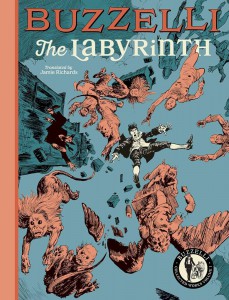
Buzzelli Collected Works Vol.1: The Labyrinth by Guido Buzzelli, translated from the Italian by Jamie Richards, Floating World Comics, 2023
Review by Catherine Xin Xin Yu, Assistant Director of Outreach
What happens if, at the end of a normal workday, a sudden blast razes the world to the ground and you become one of the few survivors? Or if, waking up on an ordinary morning, you find your head and limbs dissociating from your torso and taking off on their own? Setting the scene with these Kafkaesque premises, Italian comic master Guido Buzzelli explores the monstrosity and power of dystopian societies in his graphic novellas, The Labyrinth and Zil Zelub, with a compelling visual language that is dense yet dynamic.
Buzzelli stands apart from his peers in every way—style, form, and theme. Born into a family of artists and trained in figure drawing, he is lauded as both “the Michelangelo of monsters” for his naturalism, and “the Goya of comics” for his chimeric blend of the real and the fantastical (as pictured below). He was also one of the first Italian comic artists to tackle complex literary subjects in uncommissioned, standalone works, counter-current to the Italian comics industry of the 1960–70s that pumped out commercial series with fixed characters and simplistic plots. As a self-proclaimed “man in doubt,” Buzzelli also rebelled against the progressivism of 1960s Italy, satirising the hypocrisy of political discourse and the violence of utopian mirages while alluding to the political upheaval at the time, from terrorist bombings to murky electoral campaigns. READ MORE…
Palestinian Weather Forecast
Gaza is answering Pablo Neruda’s question, from LXVI poem in Book of Questions:
In which language does rain fall
over tormented cities?
Listen closely:
Its first shower is in the language of semiotics: deafening whirs; shaking grounds; curling heads; thumping smoke; …
Then comes the downpour in the language of math: sequence of raids; multiplied fears; subtracted lives; divided families; added damages; …
Lastly, a never-ending chilling squall in the universal language—no not music—, that is grief: when the heavy blanket is uncloaked, the glacier proves to be thickening.
Since words are stifled by politicians at the desks of the international community, Gazans have to scream to protest Israeli collective punishment—like banning electricity and water supply to 2.3 million Gazans—to supply this year’s season of rain.
Until freedom’s dawn breaks, take care to stay sane in the shelter-less, sealed-off, open-air prison.
—Carol Khoury, Editor-at-Large for Palestine and the Palestinians, and ABC manager
These words from Carol Khoury set the tone for the Asymptote blog’s call for submissions for a series of posts focused on Palestine. We are seeking dispatches from Palestine and reflections on Palestinian identity and Palestinian struggle. We are particularly interested in pieces written by writers or translators, or pieces that take up questions about language and literature in relation to the current conflict and its historical roots.
Please send pitches or completed drafts to blog@asymptotejournal.com by January 31.

